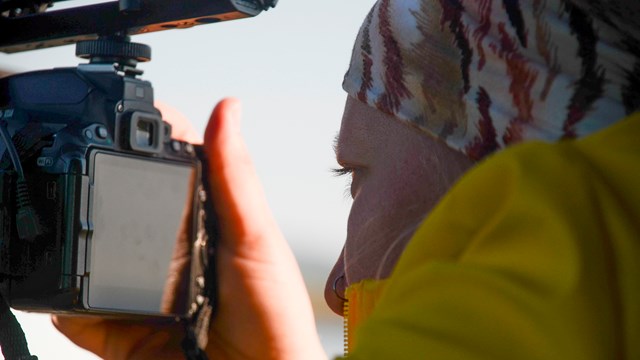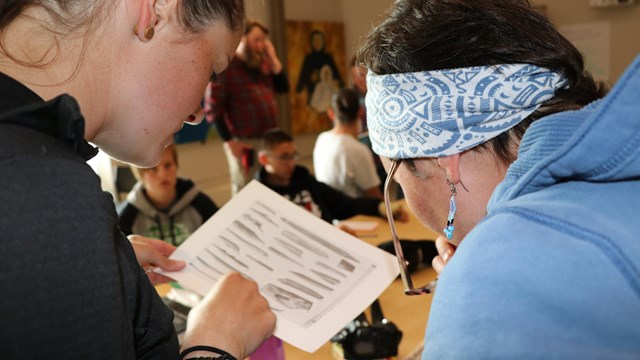
Due to staffing constraints and curatorial backlog, the preserve is not accepting research applications for any new projects in 2025. Bering Land Bridge National Preserve welcomes research projects designed to enhance the understanding of resources or systems for the purposes of park management and the advancement of broad scientific understanding. Contact us prior to seeking funding for a project that will take place within the preserve, preferably at least one year in advance of submitting a research application. It is in your best interest to contact the park and get approval before your proposal is funded. Funding for your project does not guarantee a permit. The permitting process typically requires 90 days. For projects to take place during the summer season (May 1 - Sept 30) submit your application or renewal by the last day of February. For winter season projects, submit your application 3 months prior to your anticipated start date. To aid in the preparation of a successful application, researchers should first review the following documents: Permit RequirementsA Scientific Research and Collection Permit, obtained through the online NPS Research Permit and Reporting System (RPRS) is required to conduct research on all NPS lands. This includes research conducted by NPS employees. Additional permits may be required per state and federal law, for example:
Permitting ProcessA research permit application submitted through RPRS is the first step. After an application is received, an integrated compliance review process will evaluate the proposed project for its scientific integrity and the appropriateness of research activities. Proposed projects will be reviewed by an interdisciplinary team (IDT) to evaluate:
Once you have submitted your proposal the Research Coordinator at the park will contact you to clarify any details or alert you to problems that might arise. The coordinator will meet with the park’s IDT, move your proposal through the evaluation process, provide you with updates periodically. In general, you can expect this process to take 3 or more months. Address any questions throughout the permit process to the Research Coordinator at the preserve, Nicole Braem, nicole_braem@nps.gov, (907)-759-8007 Research Permit ConditionsEvery scientific research and collecting permit includes conditions. When an investigator signs a permit, they agree to abide by all conditions stated on it. Some conditions are specific to a single study in a park. Some are specific to all studies in a given park. Below are the general conditions that apply to all permitted studies in all parks. They appear on every printed permit. Investigators may want to review these before applying for a permit. General ConditionsAuthority - The permittee is granted privileges covered under this permit subject to the supervision of the superintendent or a designee and shall comply with all applicable laws and regulations of the National Park System area and other federal and state laws. A National Park Service (NPS) representative may accompany the permittee in the field to ensure compliance with regulations. Responsibility - The permittee is responsible for ensuring that all persons working on the project adhere to permit conditions and applicable NPS regulations. False information - The permittee is prohibited from giving false information that is used to issue this permit. To do so will be considered a breach of conditions and be grounds for revocation of this permit and other applicable penalties. Assignment - This permit may not be transferred or assigned. Additional investigators and field assistants are to be coordinated by the person(s) named in the permit and should carry a copy of the permit while they are working in the park. The principal investigator shall notify the park's Research and Collecting Permit Office when there are desired changes in the approved study protocols or methods, changes in the affiliation or status of the principal investigator, or modification of the name of any project member. Revocation - This permit may be terminated for breach of any condition. The permittee may consult with park employees to clarify issues resulting in a revoked permit and the potential for reinstatement. Collection of specimens (including materials) - No specimens (including materials) may be collected unless authorized on the Scientific Research and Collecting permit. The general conditions for specimen collections are:
Reports - The permittee is required to submit an Investigator’s Annual Report and copies of final reports, publications, and other materials resulting from the study. Instructions for how and when to submit an annual report will be provided by NPS staff. Park research coordinators will analyze study proposals to determine whether copies of field notes, databases, maps, photos, and/or other materials may also be requested. The permittee is responsible for the content of reports and data provided to the National Park Service. Confidentiality - The permittee agrees to keep the specific location of sensitive park resources confidential. Sensitive resources include threatened species, endangered species, rare species, archeological sites, caves, fossil sites, minerals, commercially valuable resources, and sacred ceremonial sites. Methods of travel - Travel within the park is restricted to only those methods that are available to the general public unless otherwise specified in additional stipulations associated with this permit. Other permits - The permittee must obtain all other required permit(s) to conduct the specified project. Insurance - If liability insurance is required by the NPS for this project, then documentation must be provided that it has been obtained and is current in all respects before this permit is considered valid. Mechanized equipment - No use of mechanized equipment in designated, proposed, or potential wilderness areas is allowed unless authorized by the superintendent or a designee in additional specific conditions associated with this permit. NPS participation - The permittee should not anticipate assistance from the NPS unless specific arrangements are made and documented in either an additional stipulation attached to this permit or in other separate written agreements. Permanent markers and field equipment - The permittee is required to remove all markers or equipment from the field after the completion of the study or prior to the expiration date of this permit. The superintendent or a designee may modify this requirement through additional park specific conditions that may be attached to this permit. Additional conditions regarding the positioning and identification of markers and field equipment may be issued by staff at individual parks. Access to park and restricted areas - Approval for any activity is contingent on the park being open and staffed for required operations. No entry into restricted areas is allowed unless authorized in additional park specific stipulations attached to this permit. Notification - The permittee is required to contact the park’s Research and Collecting Permit Office (or other offices if indicated in the stipulations associated with this permit) prior to initiating any fieldwork authorized by this permit. Ideally this contact should occur at least one week prior to the initial visit to the park. Expiration date - Permits expire on the date listed. Nothing in this permit shall be construed as granting any exclusive research privileges or automatic right to continue, extend, or renew this or any other line of research under new permit(s). Other stipulations - This permit includes by reference all stipulations listed in the application materials or in additional attachments to this permit provided by the superintendent or a designee. Breach of any of the terms of this permit will be grounds for revocation of this permit and denial of future permits. Park Specific ConsiderationsNumerous inholdings and Native allotments exist within Bering Land Bridge National Preserve. Be aware that allotments are private land and an NPS permit does not authorize access to or use of these lands. Researchers are directed to the Alaska Department of Natural Resources website to obtain title plats by township (designated as "Allotments" or "US Surveys").

Film and Still Photography
Filming and still photography is allowed in the preserve and may require a permit. 
Social Science Surveys and Interviews
Surveys of the public or other information collection activity conducted, funded, or sponsored by the NPS may be subject to OMB clearance. More Information |
Last updated: March 31, 2025
